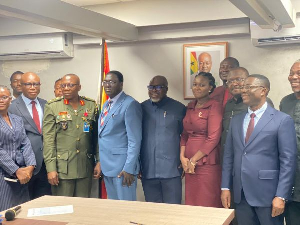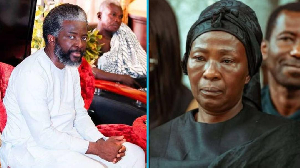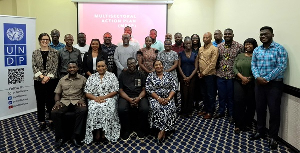The Rubber Outgrowers and Agents Association (ROAA) has expressed displeasure over the dictatorship style and unfair trade practices of the Ghana Rubber Estate Limited (GREL) to its members.
According to them, GREL has recently been very dictatorial in its decision-making and were implementing decisions that were negatively affecting rubber outgrowers.
Speaking at a press conference at Agona Nkwanta in the Ahanta West Municipality of the Western Region, the National Chairman of ROAA, Isaac Castro Bosomtwe, said the earlier government intervened, the better for the rubber industry.
Cataloging recent unfair decisions taken by GREL, Mr. Bosomtwe explained that on August 1, 2019, GREL "went ahead to implement the reduction of the Dry Rubber Content from 58% to 57.5% at the blind side of the association after a stalemate", adding that, such a component was part of the price mechanism agreed between GREL and ROAA through a Memorandum of Understanding (MoU) and that it should not be changed without the consent of one of the parties.
"Again, on 10th February 2020, GREL issued a letter stating they cannot pay suppliers of raw rubber within 24 hours. They will rather pay within 60 days with immediate effect", adding that, GREL attributed its decision to the effect the coronavirus was having on tyre manufacturers in China and Malaysia but "there was no meeting to discuss the implication of that decision on other stakeholders".
He said on February 13, 2020, ROAA wrote to GREL, asking the latter to convene a meeting to discuss the impact of its decisions on stakeholders but GREL has since not responded to the letter.
"Another painful thing the farmers are subjected to is the payment of penal interest on principal and interest by the banks due to delayed payment not caused by the farmers but GREL. Per the Tripartite Agreement, GREL is to deduct 25% from farmers' product sent to GREL for loan repayment. GREL has rigorously performed this task but it does not immediately transfer the money deducted for loan repayment to the banks. Therefore the banks charge the farmers penal interest for an offense they have not committed. GREL delays payment to the banks and the farmers are penalized", he continued.
The situation, he said, has forced some farm owners to resort to side sellers at a reduced price.
"We are therefore calling on the Government of Ghana (GoG) so that the rubber industry does not collapse under the watch of His Excellency Nana Akufo Addo", he appealed.
"If the government does not intervene in this matter, the perception of the rubber farmer on the government could affect its election prospects", he said.
He, therefore, concluded that "much as we appreciate the economic effects of the coronavirus on the rubber industry worldwide, all stakeholders should meet so that no actor in the rubber value chain is disadvantaged".
Business News of Wednesday, 26 February 2020
Source: Daniel Kaku, Contributor













